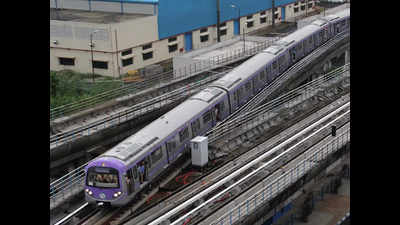- News
- City News
- kolkata News
- No e-pass for Kolkata Metro ride from Monday
Trending
This story is from January 14, 2021
No e-pass for Kolkata Metro ride from Monday
From next Monday, Metro will operate almost like it did in the pre-Covid days — without e-passes. Once again, trains will run at 6-minute frequencies during peak hours, with 12 more daily services added and taking the total to 240.

File photo of a Kolkata Metro train
KOLKATA: From next Monday, Metro will operate almost like it did in the pre-Covid days — without e-passes. Once again, trains will run at 6-minute frequencies during peak hours, with 12 more daily services added and taking the total to 240.
On Wednesday, Metro Railway issued the formal notification in this regard. “We shall keep adding services till we reach our pre-pandemic services of 288.This will prevent crowding.” said an official.
TOI reported last Thursday that the state transport department had informed Ideation Technology, developer of the e-pass, that its contract will not be extended beyond Friday (January 15). Weekends are already exempted from the purview of e-passes. So, Metro Railway will start its operation without e-passes from the following week (January 18).
Metro Railway general manager Manoj Joshi told TOI, “In our assessment, we can now completely do without e-passes. The Covid situation has improved. Our ridership is only 25% of the pre-pandemic times. We are not issuing tokens. Schools and colleges haven’t reopened. So, we can continue to follow distancing norms inside trains. At the same time, commuters, especially those living in the suburbs, who have stayed away from the Metro because they would find downloading digital passes cumbersome, may now be encouraged to take the Metro.”
On Wednesday, Metro Railway issued the formal notification in this regard. “We shall keep adding services till we reach our pre-pandemic services of 288.This will prevent crowding.” said an official.
TOI reported last Thursday that the state transport department had informed Ideation Technology, developer of the e-pass, that its contract will not be extended beyond Friday (January 15). Weekends are already exempted from the purview of e-passes. So, Metro Railway will start its operation without e-passes from the following week (January 18).
Metro Railway general manager Manoj Joshi told TOI, “In our assessment, we can now completely do without e-passes. The Covid situation has improved. Our ridership is only 25% of the pre-pandemic times. We are not issuing tokens. Schools and colleges haven’t reopened. So, we can continue to follow distancing norms inside trains. At the same time, commuters, especially those living in the suburbs, who have stayed away from the Metro because they would find downloading digital passes cumbersome, may now be encouraged to take the Metro.”
The colour-coded e-passes, generated from a URL and booked in advance to access the north-south line, were key to controlling crowd when Metro resumed services after lockdown. But the carrier has been easing e-pass rules gradually, allowing senior citizens, women and children to board without them. Since January 4, e-pass hours were reduced to two in the morning and two in the evening on weekdays.
End of Article
FOLLOW US ON SOCIAL MEDIA










